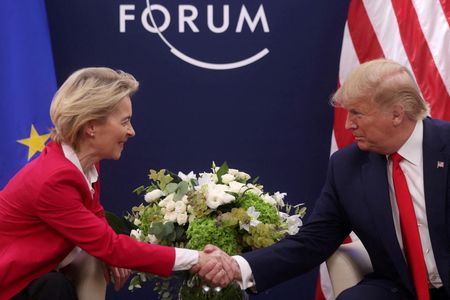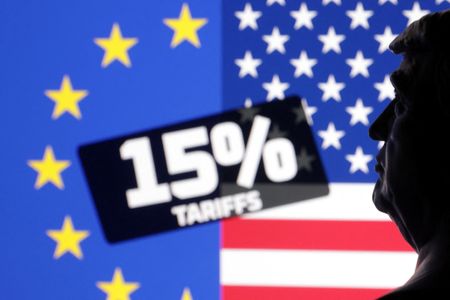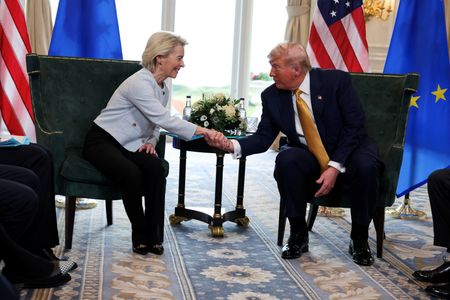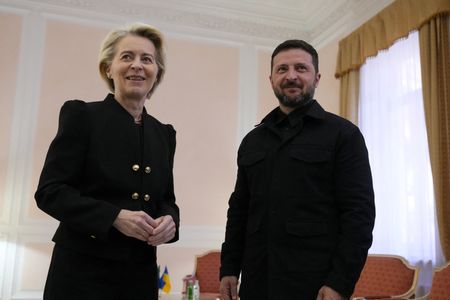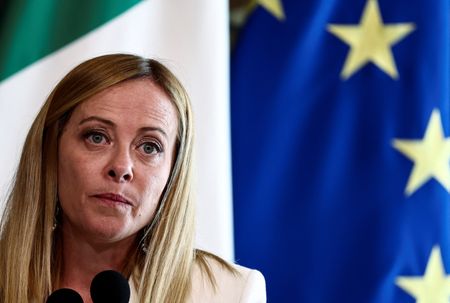By Caroline Valetkevitch and Lewis Krauskopf
NEW YORK (Reuters) -Investors appeared to embrace news of a trade deal between the U.S. and European Union on Sunday that is expected to bring clarity for companies and some certainty to markets ahead of U.S. President Donald Trump’s Friday tariffs deadline.
The euro rose against the U.S. dollar and was last up 0.15% at $1.176. The currency also was up about 0.1% against the pound and 0.2% against the Japanese yen.
U.S. stock index futures rose after resuming trading late Sunday, with S&P 500 e-minis last up 0.3% and Nasdaq futures up 0.4%. Nikkei futures also traded higher.
Trump and European Commission President Ursula von der Leyen on Sunday announced the deal, which imposes a 15% import tariff on most European Union goods, half the threatened rate.
The EU-US deal is similar to parts of the framework agreement the U.S. clinched with Japan last week, but it also leaves open questions, including tariff rates on spirits.
“It’s really in line with the Japan deal, and I assume investors will view it positively as they viewed the Japan deal,” said Rick Meckler, partner at Cherry Lane Investments in New Vernon, New Jersey.
“The reality is there will be higher tariffs, which may lead to more inflation, depending on how much of it is absorbed by the manufacturers and how much of it is passed on to consumers.”
Michael Brown, senior research strategist at Pepperstone in London, said: “For the euro, it removes that risk of a huge tariff and potentially getting towards trade embargo levels with the U.S.”
Optimism over easing trade tensions broadly helped push U.S. stocks to record highs last week and lifted European shares to their highest since early June.
“It is odd to think that a late July week in the middle of the summer could prove to be the most pivotal of the year. It has already started with a key trade deal with a major partner,” Michael O’Rourke, chief market strategist at JonesTrading in Stamford, Connecticut, wrote in a note following the news.
Investors have been bracing for increased volatility heading into August 1, which the U.S. has set as a deadline for raising levies on a broad swath of trading partners.
Trump’s April 2 “Liberation Day” announcement of sweeping global tariffs sent stocks plunging in the immediate aftermath, due to spiking fears about a recession that have since faded.
Holger Schmieding, chief economist at Berenberg Bank in London, said of the EU-U.S. announcement: “The crippling uncertainty is largely over, the deal is bearable for the EU. Modestly good news for equity markets, that probably priced in most of it beforehand.
“But of course, the outcome is still bad relative to the situation that prevailed before Trump started his trade wars.”
The announcement came after Von der Leyen traveled to Scotland for talks with Trump to push a hard-fought deal over the line.
Von der Leyen said the 15% tariff applied “across the board,” including automobiles, semiconductors and pharmaceuticals. Trump said the deal also calls for $750 billion of EU purchases of U.S. energy in coming years and “hundreds of billions of dollars” of arms purchases.
“We will need to see how long the sides stick to the deal,” Eric Winograd, chief economist at investment management firm AllianceBernstein, said.
(Reporting by Lewis Krauskopf and Caroline Valetkevitch; additional reporting by Lucy Raitano in London, Matt Tracy in Washington DC and Karin Strohecker; editing by Alden Bentley, Edward Tobin, Amanda Cooper, Nick Zieminski and Marguerita Choy)

